实验1
实验任务1
代码:

1 // 现代C++标准库、算法库体验 2 // 本例用到以下内容: 3 // 1. 字符串string, 动态数组容器类vector、迭代器 4 // 2. 算法库:反转元素次序、旋转元素 5 // 3. 函数模板、const引用作为形参 6 7 #include<iostream> 8 #include<string> 9 #include<vector> 10 #include<algorithm> 11 12 using namespace std; 13 14 // 声明 15 // 模板函数声明 16 template<typename T> 17 void output(const T &c); 18 19 // 普通函数声明 20 void test1(); 21 void test2(); 22 void test3(); 23 24 int main(){ 25 cout << "测试1:\n"; 26 test1(); 27 28 cout <<"\n测试2:\n"; 29 test2(); 30 31 cout << "\n测试3:\n"; 32 test3(); 33 } 34 35 // 函数实现 36 // 输出容器对象c中的元素 37 template <typename T> 38 void output(const T &c){ 39 for(auto &i: c) 40 cout << i << " "; 41 cout << endl; 42 } 43 44 // 测试1 45 // 组合使用算法库、迭代器、string反转字符串 46 void test1(){ 47 string s0{"0123456789"}; 48 cout << "s0 = " << s0 << endl; 49 50 string s1{s0}; 51 reverse(s1.begin(),s1.end());// 反转指定迭代器区间的元素 52 cout << "s1 = " << s1 <<endl; 53 54 string s2{s0}; 55 reverse_copy(s0.begin(),s0.end(),s2.begin());// 将指定迭代区间的元素拷贝到指定迭代器开始的目标区间,并且在复制过程中反转次序 56 57 cout << "s2 = " << s2 <<endl; 58 } 59 60 // 测试2 61 // 组合使用算法库、迭代器、vector反转动态数组对象vector内数据 62 void test2(){ 63 vector<int> v0{2,0,4,9}; 64 cout << "v0: "; 65 output(v0); 66 67 vector<int> v1{v0}; 68 reverse(v1.begin(),v1.end()); 69 cout<<"v1: "; 70 output(v1); 71 72 vector<int> v2{v0}; 73 reverse_copy(v0.begin(),v0.end(),v2.begin()); 74 cout << "v2: "; 75 output(v2); 76 } 77 78 // 测试3 79 // 组合使用算法库、迭代器、vector实现元素旋转移位 80 void test3(){ 81 vector<int> v0{0,1,2,3,4,5,6,7,8,9}; 82 cout << "v0: "; 83 output(v0); 84 85 vector<int> v1{v0}; 86 rotate(v1.begin(),v1.begin()+1,v1.end());// 旋转指定迭代器区间[v1.begin(), v1.end())之间的数据项,旋转后从迭代器v1.begin()+1位置的数据项开始 87 88 cout << "v1: "; 89 output(v1); 90 91 vector<int> v2{v0}; 92 rotate(v2.begin(),v2.begin()+2,v2.end()); 93 cout << "v2: "; 94 output(v2); 95 96 vector<int> v3{v0}; 97 rotate(v3.begin(),v3.end()-1,v3.end()); 98 cout<< "v3: "; 99 output(v3); 100 101 vector<int> v4{v0}; 102 rotate(v4.begin(),v4.end()-2,v4.end()); 103 cout << "v4: "; 104 output(v4); 105 }
运行结果截图:
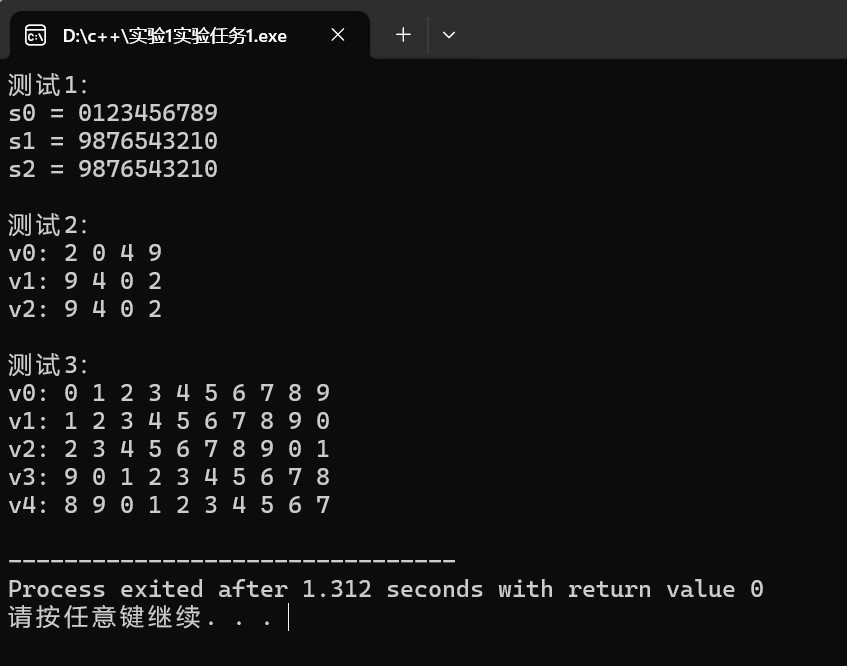
实验任务2
代码:

1 #include <iostream> 2 #include <vector> 3 #include <string> 4 #include <algorithm> 5 #include <numeric>//算法包括求最大值、最小值、均值 6 #include <iomanip> 7 8 using namespace std; 9 10 template<typename T> 11 void output(const T &c); 12 13 int rand_int_100(); 14 void test1(); 15 void test2(); 16 17 int main() { 18 cout << "测试1: \n"; 19 test1(); 20 21 cout << "\n测试2: \n"; 22 test2(); 23 } 24 25 template <typename T> 26 void output(const T &c) { 27 for(auto &i: c) 28 cout << i << " "; 29 cout << endl; 30 } 31 32 // 返回[0, 100]区间内的一个随机整数 33 int rand_int_100() { 34 return rand() % 101; 35 } 36 37 //赋值、排序 38 void test1() { 39 vector<int> v0(10); // 创建一个动态数组对象v0, 对象大小为10 40 //generate标准库算法,定义在<numeric> ,作用:它用于生成一个值的序列,并将其赋值给一个迭代器范围内的元素。 41 generate(v0.begin(), v0.end(), rand_int_100); // 产生[0, 100]之间的随机整数赋值给指定迭代器区间[v0.begin(), v0.end())内的每个数据项 42 cout << "v0: "; 43 output(v0); 44 45 vector<int> v1 {v0}; 46 sort(v1.begin(), v1.end()); // 对指定迭代器区间[v1.begin(), v1.end())内数据项进行升序排序 47 cout << "v1: "; 48 output(v1); 49 50 vector<int> v2 {v0}; 51 sort(v2.begin()+1, v2.end()-1); // 对指定迭代器区间[v1.begin()+1, v1.end()-1)内数据项进行升序排序 52 cout << "v2: "; 53 output(v2); 54 } 55 56 // 对容器类对象指定迭代器区间进行赋值、计算最大值/最小值/均值 57 void test2() { 58 vector<int> v0(10); 59 generate(v0.begin(), v0.end(), rand_int_100); 60 cout << "v0: "; 61 output(v0); 62 63 auto iter1 = min_element(v0.begin(), v0.end()); 64 cout << "最小值: " << *iter1 << endl; 65 66 auto iter2 = max_element(v0.begin(), v0.end()); 67 cout << "最大值: " << *iter2 << endl; 68 69 auto ans = minmax_element(v0.begin(), v0.end());//minmax_element,先是 min,再 max,所以,返回的类中的数据成员 first 对应着最小值,second 对应着最大值。 70 cout << "最小值: " << *(ans.first) << endl; 71 cout << "最大值: " << *(ans.second) << endl; 72 double avg1 = accumulate(v0.begin(), v0.end(), 0)/v0.size();//accumulate累加求和 ,第三个是初始值为0,v0.size求个数 73 cout << "均值: " << fixed << setprecision(2) << avg1 << endl;//精确两位 74 //fixed 是一个流操纵符,用于设置输出流的浮点数显示格式。 75 //当应用了 fixed 操纵符后,浮点数将始终以固定小数点格式输出,保留小数点后六位(不是六位有效位),而不是科学计数法 76 cout << endl;//空格 77 vector<int> v1 {v0}; 78 cout << "v0: "; 79 output(v0); 80 sort(v1.begin(), v1.end()); 81 double avg2 = accumulate(v1.begin()+1, v1.end()-1, 0)/(v1.size()-2); 82 cout << "去掉最大值、最小值之后,均值: " << avg2 << endl; 83 }
运行结果截图:
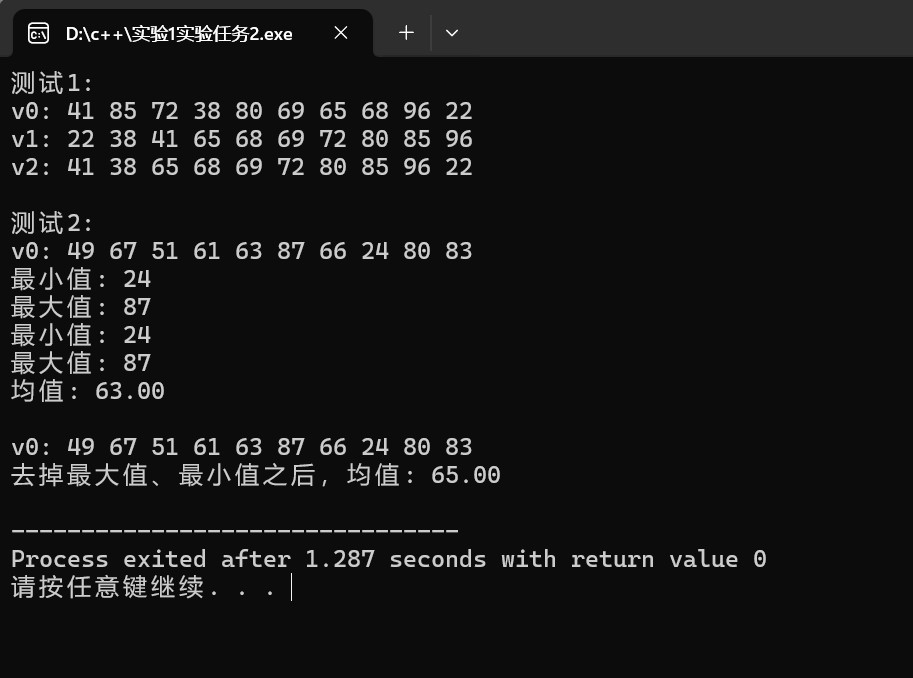
实验任务3
代码:

1 #include <iostream> 2 #include <string> 3 #include <algorithm> 4 bool is_palindrome(std::string s); 5 6 int main() { 7 using namespace std; 8 string s; 9 while(cin >> s) 10 cout << boolalpha << is_palindrome(s) << endl; 11 } 12 13 bool is_palindrome(std::string a){ 14 int len = a.size(); 15 std::string b = a; 16 char t; 17 int i; 18 for(i=0;i<len/2;i++){ 19 t = a[i]; 20 a[i] = a[len-1-i]; 21 a[len-i-1] = t; 22 } 23 if(b == a){ 24 return true; 25 }else{ 26 return false; 27 } 28 }
运行结果截图:
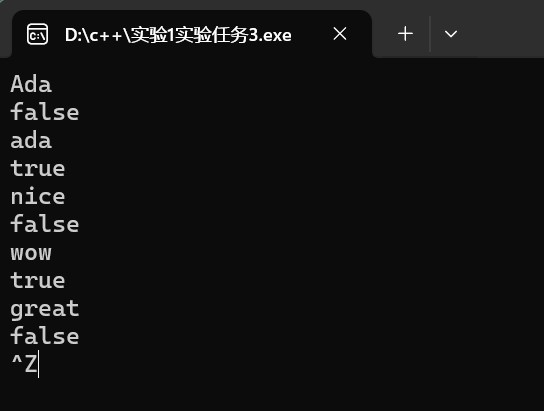
实验任务4
代码:

1 #include <iostream> 2 #include <string> 3 #include <algorithm> 4 5 std::string dec2n(int x, int n = 2); 6 7 int main() { 8 using namespace std; 9 10 int x; 11 while(cin >> x) { 12 cout << "十进制: " << x << endl; 13 cout << "二进制: " << dec2n(x) << endl; 14 cout << "八进制: " << dec2n(x, 8) << endl; 15 cout << "十六进制: " << dec2n(x, 16) << endl << endl; 16 } 17 } 18 19 // 函数dec2n定义 20 std::string dec2n(int x, int n){ 21 using namespace std; 22 string result; 23 string shu="0123456789ABCDEF"; 24 while(x>0) 25 { 26 int remember=x%n; 27 result=shu[remember]+result; 28 x/=n; 29 } 30 if(result.empty()){ 31 return "0"; 32 } 33 return result; 34 }
运行结果截图:
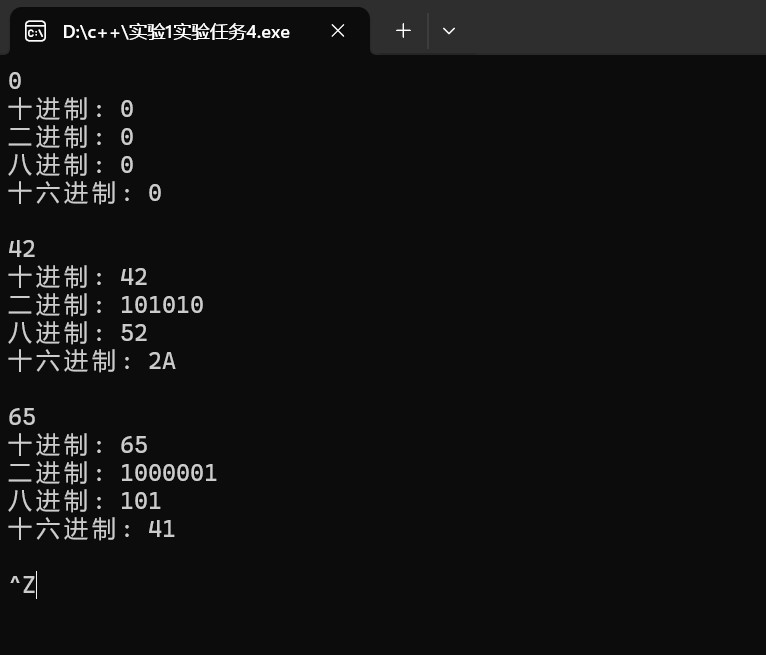
实验任务5
代码:

1 #include<iostream> 2 #include<string> 3 #include<vector> 4 #include<algorithm> 5 #include<iomanip> 6 7 using namespace std; 8 9 template<typename T> 10 void output(const T &c); 11 12 void fun(); 13 14 int main(){ 15 cout << " a b c d e f g h i j k l m n o p q r s t u v w x y z" << endl; 16 int i; 17 for(i=1;i<=26;i++){ 18 fun(); 19 } 20 } 21 22 template <typename T> 23 void output(const T &c){ 24 for(auto &i: c) 25 cout << i << " "; 26 cout << endl; 27 } 28 int j=1; 29 void fun(){ 30 string s0={"ABCDEFGHIJKLMNOPQRSTUVWXYZ"}; 31 rotate(s0.begin(),s0.begin()+j,s0.end()); 32 cout << setw(2) << j << " "; 33 output(s0); 34 j++; 35 }
运行结果截图:
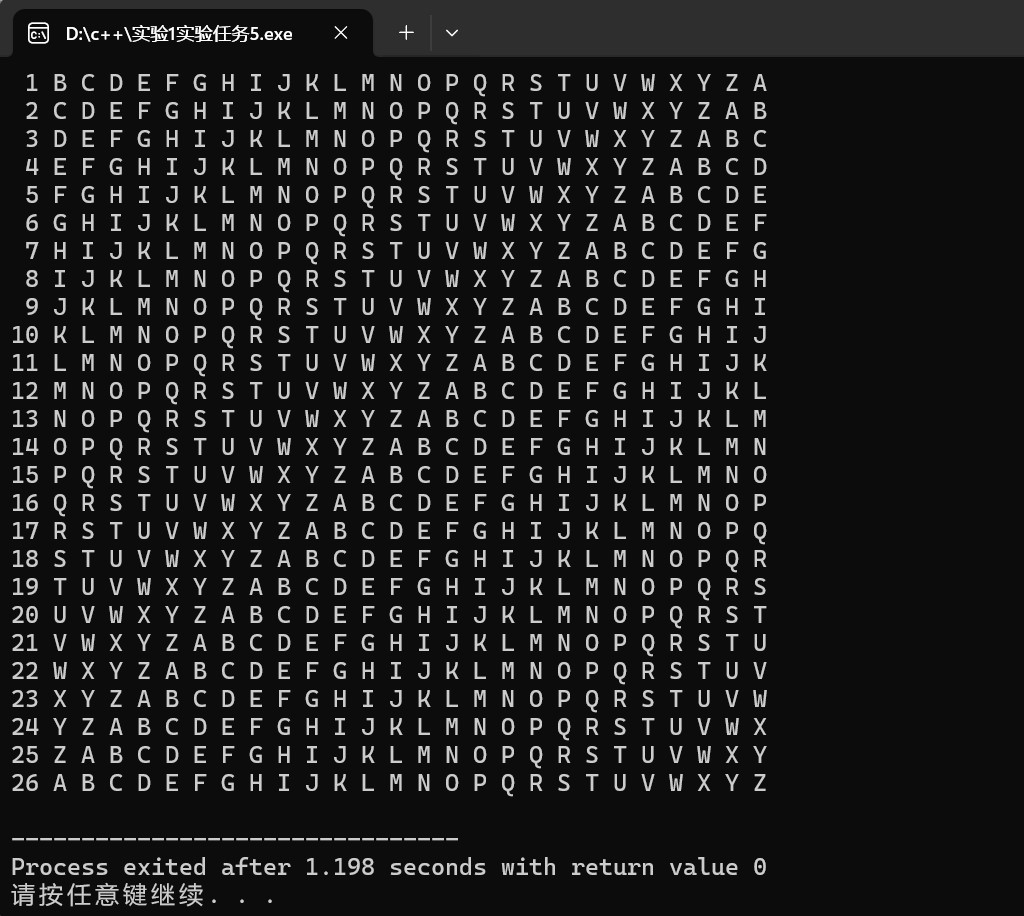
实验任务6
代码:

1 #include <iostream> 2 #include <cstdlib> 3 #include <ctime> 4 #include <iomanip> 5 6 using namespace std; 7 8 int ran_int_10(); 9 10 int rand_int_10(){ 11 return rand() % 10; 12 } 13 14 int main() { 15 srand(static_cast<unsigned int>(time(nullptr))); 16 int sum = 0; 17 for (int i = 0; i < 10; ++i) { 18 int num1 = rand_int_10() % 10 + 1; 19 int num2 = rand_int_10() % 10 + 1; 20 int operators = rand() % 4; 21 int res; 22 string operation; 23 switch (operators) { 24 int t; 25 case 0: 26 operation = "*"; 27 res = num1 * num2; 28 break; 29 case 1: 30 if (num1 % num2!= 0) { 31 if (num1 < num2) { 32 t = num1; 33 num1 = num2; 34 num2 = t; 35 } 36 num1 = num1 % num2 == 0? num1 : num2 * (rand() % (num1 / num2) + 1); 37 } 38 operation = "/"; 39 res = num1 / num2; 40 break; 41 case 2: 42 operation = "+"; 43 res = num1 + num2; 44 break; 45 case 3: 46 if (num1 < num2) { 47 t = num1; 48 num1 = num2; 49 num2 = t; 50 } 51 operation = "-"; 52 res = num1 - num2; 53 break; 54 } 55 int answer; 56 cout << num1 << " " << operation << " " << num2 << " = "; 57 cin >> answer; 58 if (answer == res) { 59 sum++; 60 } 61 } 62 double accuracy = (double)sum / 10 * 100; 63 cout << "正确率为:" << accuracy << "%"; 64 return 0; 65 }
运行结果截图:
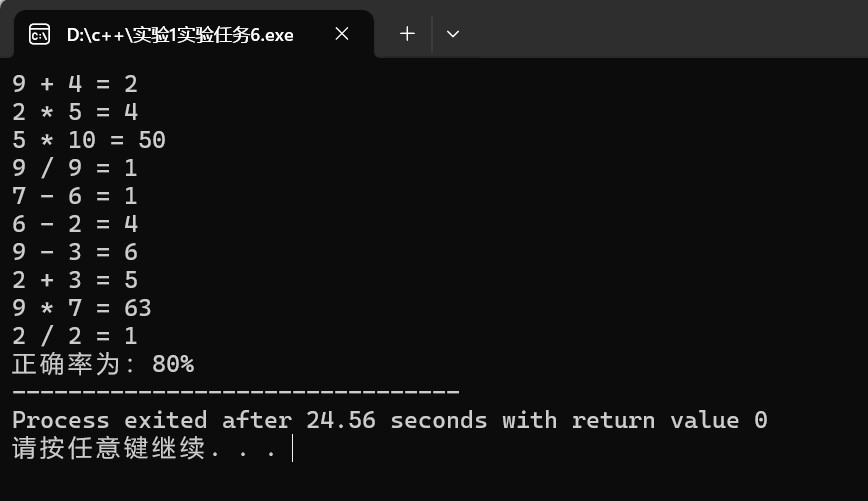
实验总结:
1、C++标准库和算法库的使用:通过实验任务1和任务2,我学会了如何使用C++标准库中的string、vector等容器类,以及算法库中的reverse、sort、min_element、max_element等函数。这些工具和函数极大地简化了编程过程,提高了代码的可读性和可维护性
2、C++的强大表达能力:通过实验任务3-6,我发现了C++在解决具体问题时的强大表达能力。 无论是判断回文串、实现进制转换,还是打印字母密文对照表、自动生成算术运算题目并评测,C++都能提供简洁而高效的解决方案。




 浙公网安备 33010602011771号
浙公网安备 33010602011771号